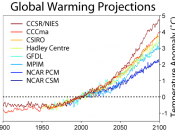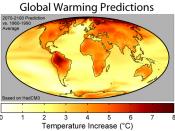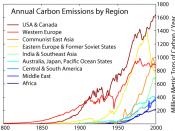Kyoto Accord
By Jon Robertson
The Kyoto Accord is an international treaty where countries agree to reduce the amount of greenhouse gases they emit if their neighbors do likewise. It is a very complex agreement that allows trading pollution credit. No region of the world will be unaffected if Global Warming continues to increasingly grow. Yet day after day people take actions that can change the earth and its climate in significant ways. Many people just stand motionless as the wave of climate change becomes more apparent. It is absolutely mandatory that the nations of the world work multilaterally to not only address the problem of Global Warming, but also resolve and decipher the crisis that it withholds.
The IPCC predicts that during the next century, the average rate of warming will be greater than anything seen in the last 10,000 years. Global sea levels could rise by at least fifteen and perhaps as much as ninety-five centimeters.
Surface temperatures could increase by between 1.0 and 3.5 degrees Celsius.
With climate change there will be an even greater complexity with water resources in every branch of the globe. Nineteen countries are under strain for deficiency of water. This figure is expected to double by the year 2025 even if the climate does not change.
Childhood asthma, already at record highs, is expected to grow even worse in the coming years due to a potent mix of air pollution, higher levels of pollen and changes in the types of molds spurred by global warming. Asthma among pre-school children is at an all-time high: It grew 160 percent between 1980-1994, with the highest incidence found among poor and minority children in urban centers. These children are at greatest risk for suffering increased health problems as a result of the CO2-generated increase...


